Searching for quick degrees online? You CAN finish your degree sooner than you think.

We’re going to give you a list of methods you can use today to speed up how long it takes you to complete a college degree. We’ll also walk you through a few examples of JUST how quickly you could get an associate’s or bachelor’s degree.
Editorial Listing ShortCode:
Online Degree Programs
- Accounting
- Business Administration
- Computer Science
- Criminal Justice
- Education
- English
- Finance
- Fire Science
- Forensics & Crime Scene Investigation
- Health Sciences
- Healthcare Administration
- Human Services
- Information Technology
- Legal Studies
- Liberal Arts
- Management
- Marketing
- Psychology
- Public Administration
- Public Health
No matter what college you choose to attend, you can speed up the time to being done by taking advantage of the tactics below. To get started, let’s take a closer look at the options for your fields of study so that you’ll have a better idea of what your educational and career future might hold.
Accounting

As an accounting professional, you can help businesses keep track of important facts and figures. To prepare for this career, you’ll take bachelor’s classes like Federal Taxation, Accounting Ethics, and Cost Management.
After graduation, you could go into auditing, business accounting, or taxation. This program may help you earn many of the hours required to sit for the Certified Public Accountant (CPA) exam.
Editorial Listing ShortCode:
Business Administration

If you have a mind for business, enhance it with a bachelor’s degree in business administration. Through classes like Supply Chain Management, Macroeconomics and Microeconomics, Data and Statistics, and Human Resources Leadership, this degree program will give you a broad overview of business principles.
Concentration options may include Healthcare Management and Global Business. After graduation, you’ll be prepared to enter the business world or pursue further education with an MBA.
Editorial Listing ShortCode:
Computer Science

With an online computer science degree, you’ll study computer hardware and software. Then, you’ll be able to use computer systems to meet needs and solve problems. As a computer science professional, you might be a programmer, a developer, a network administrator, or a systems analyst.
To prepare you for those jobs, you’ll study programming languages, cybersecurity, advanced mathematics, and data algorithms. Some students opt for a degree concentration, such as Security or Cloud Computing.
Editorial Listing ShortCode:
Criminal Justice

If you dream of becoming a police officer, a bachelor’s degree in criminal justice can help you get there. This bachelor’s program is also useful for those who want to work in courtrooms, correctional facilities, or law offices.
In undergraduate classes like Crime Prevention, Ethics in Criminal Justice, and Crime Statistics, you’ll study legal basics, law enforcement, sociology, and technology. For a concentration, you could choose Juvenile Corrections or Homeland Security.
Editorial Listing ShortCode:
Education

To have a classroom of your own someday, start by earning an education bachelor’s degree. Depending on your concentration, your degree program may prepare you for licensure as an elementary or secondary teacher.
Some students focus on special education or early childhood instruction. Your studies could also help you go into childcare, literacy development, or adult education. The classes may include Educational Psychology, Instructional Planning, and Diversity in the Classroom.
Editorial Listing ShortCode:
English

Whether you want to be a writer, an editor, or even a lawyer, a bachelor’s in English can help you get started. You’ll study grammar, composition, and literature.
Your coursework will help strengthen your critical-thinking skills, and you and your classmates will discuss the influence of the written word. In your literature studies, you will probably study many American, British, and global authors.
Editorial Listing ShortCode:
Finance

If you’re interested in stocks, loans, and banking, consider earning your bachelor’s degree in finance. In this business-focused program, you will take classes like International Finance, Analysis of Financial Statements, Investments, and Finance Law.
After completing a finance program, you might choose to pursue a job with a bank or another financial institution. You could also start your own business or work in the finance department of a corporation, a hospital, or a school district.
Editorial Listing ShortCode:
Fire Science

Earning a bachelor’s degree in fire science can make you a more appealing candidate for entry-level firefighting jobs or for advancement within a department. Your coursework will cover the science of combustion, fire prevention, and fire suppression.
Other topics may include hazardous materials, fire investigation, and emergency medical services. In addition to working in a local fire department, you could also fight forest fires, investigate arson cases, or enforce codes.
Editorial Listing ShortCode:
Forensics & Crime Scene Investigation
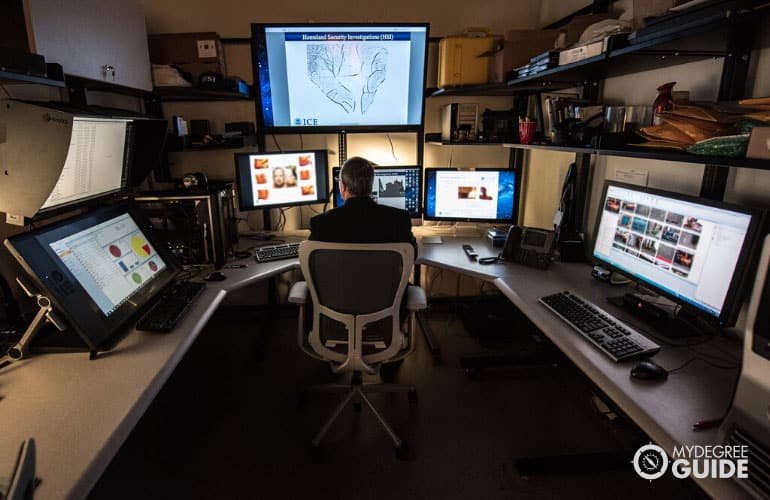
Help analyze clues and solve crimes with a bachelor’s degree in forensics and crime scene investigation. This field of study often requires a strong grasp of scientific concepts. You’ll take classes like Criminal Investigation, Criminal Law, and Crime Scene Management.
Fingerprints, firearms, photography, and terrorism may be some of the topics covered in your course of study. Your degree program may prepare you to be a detective, a forensic scientist, or a crime scene investigator.
Editorial Listing ShortCode:
Health Sciences

Patients rely on professionals with health knowledge to help with their care and wellbeing. You can prepare to work in this field by earning an undergraduate degree in health sciences. The classes in this program will cover topics like epidemiology, health informatics, and public health.
You can use your bachelor’s degree to get a job as a community health worker, a lab technician, or a paramedic, or you could enter a health-focused master’s program.
Editorial Listing ShortCode:
Healthcare Administration

Organized, efficient administrative work in medical settings can improve patient care. A healthcare administration bachelor’s degree will equip you to provide leadership, use data technology, and create positive patient interactions.
Some programs offer concentration options, such as Leadership or Information Management. Your healthcare administration bachelor’s degree may help you get a job as a medical services manager. You could work for a health insurance company, a doctor’s office, or a health department.
Editorial Listing ShortCode:
Human Services

You care about helping people, so transform that passion into a lifelong career with a bachelor’s degree in human services. Topics you’ll study include sociology, psychology, human development, and case management.
You may have the option to refine your studies by selecting a concentration, such as Addictions, Youth Services, or Social Justice. For a career, you could consider being a caseworker, a youth advocate, a residential caregiver, or a probation officer.
Editorial Listing ShortCode:
Information Technology

For a STEM degree that you can use in many different industries, choose to get your bachelor’s degree in information technology. An IT program will help you learn about networking, cloud systems, and programming languages.
Data storage, organization, and security are some of an IT professional’s most critical responsibilities. This is a good degree to pursue if you’re interested in developing apps, being a network administrator, or managing IT systems.
Editorial Listing ShortCode:
Legal Studies

You can explore the topics of law and justice when you study for a bachelor’s in legal studies. You’ll learn how to perform legal research and how to communicate about legal matters.
Your program will familiarize you with family and criminal law, and you’ll learn about the rights of American citizens. After completing your bachelor’s degree, you could enter law school or start working as a legal assistant, a paralegal, or a court reporter.
Editorial Listing ShortCode:
Liberal Arts
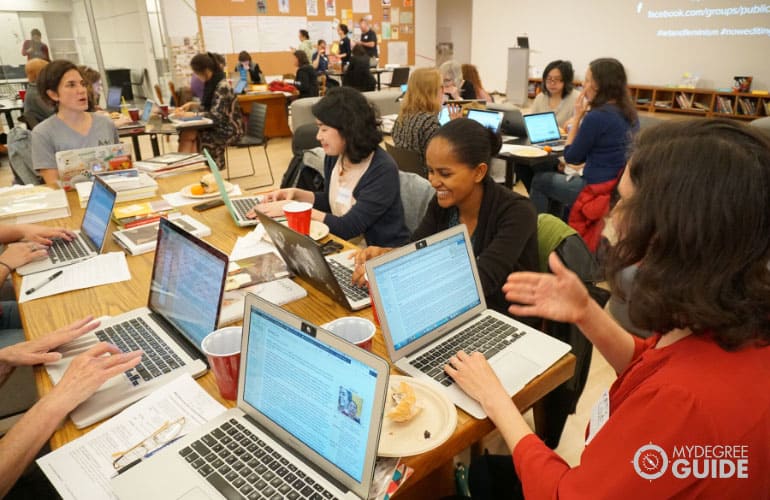
A bachelor’s degree in liberal arts is an interdisciplinary program that gives you a good deal of control over your course of study. Many of your classes will be in the social sciences and the humanities. You may study literature, art, psychology, ethics, history, philosophy, and composition.
Liberal Arts is a flexible program, so this college degree can be useful in many industries. Many graduates continue their education with higher degrees in law or teaching.
Editorial Listing ShortCode:
Management

For a degree that will prepare you to take a sales or business position, look into a bachelor’s in management. This program covers topics like statistics, accounting, team dynamics, business law, ethics, and economics.
You may take classes such as Organizational Change, Foundations of Human Resources, and Team Management. Graduates often hold positions as managers or analysts in the business world. They may be responsible for sales, finances, or marketing.
Editorial Listing ShortCode:
Marketing

If you’re a strong communicator and have sharp analytical skills, then a career in marketing might be for you. Typical classes in a marketing bachelor’s program include Business Communication, Global Marketing, Selling and Retailing, and Digital Marketing.
You’ll learn about subjects like economics, ethics, project management, and statistics. Many graduates take advertising jobs, but you could also consider being a market researcher, a brand manager, or a social media coordinator.
Editorial Listing ShortCode:
Psychology

A bachelor’s in psychology is a versatile degree option that will equip you with skills that you can use in many different industries. Psychology students learn about human behavior so that they can influence decisions.
Personality Theory, Human Development, History of Psychology, and Social Psychology are some of the classes you might take. If you want to work one-on-one with people, you could become a caseworker or a residential counselor, or you could pursue graduate clinical studies.
Editorial Listing ShortCode:
Public Administration

For working in municipal government, nonprofit leadership or other civic-minded organizations, you will need the skills that are taught in a bachelor’s program in public administration. Your undergraduate classes may include Fundamentals of Public Policy, American Laws and Government, Public Finance, and Team Leadership.
You’ll learn to write grants, communicate effectively, work within a budget, and manage personnel. Career options include program management, nonprofit administration, and urban planning.
Editorial Listing ShortCode:
Public Health

Do you have a passion to ensure that people have equal access to healthcare, or are you interested in organizing community health initiatives? If so, consider a bachelor’s degree in public health. Topics covered will include epidemiology, global health, program management, and healthcare delivery.
You may be able to choose a concentration like Health Behavior or Healthcare Management. Graduates often work for hospitals, health departments, insurance companies, and nonprofit agencies.
Editorial Listing ShortCode:
Quick Degrees Online – 12 Methods to Help You Finish College Quickly

Now that you have an idea of what you might like to study, let’s talk about how you can finish your degree as quickly as possible. By using a combination of the methods listed below, you can accumulate college credits and fast-track your degree completion.
In some cases (like Method #1), you can earn credit for 2 college classes in just 90 minutes! Or 4 college classes in 3 hours! One of our staff members skipped an entire semester of college using this method alone, and so can you!
- Max out your university’s credit by exam policy
- Turn your life experience into college credits with a Credit for Prior Learning portfolio
- Get college credit for your certifications and licenses
- Take the maximum credits allowed each semester
- Get college credit for your military experience
- Participate in an internship
- Participate in an Alternative Break program for college credit
- Enroll in an Intersession Abroad
- Take dual credit classes
- Take Advanced Placement (AP) classes
- Participate in an International Baccalaureate (IB) Diploma program
- Take part in a pre-college summer program
If you read through these tips and aren’t sure how to implement any of these methods, leave a comment, and we will answer any questions you may have.

Max out your university’s credit by exam policy
Did you know that most universities will give you the option to get credit for a class that you didn’t attend? This is called credit by exam. Here’s how it works using Midwestern State University as an example.
Most universities will be similar to MSU.
- Check out your college’s online handbook to see how many credit by exam credits they will allow. MSU allows 60 credit hours. Most will allow between 15 and 30 credits. Each school has their own policies on what exams are allowed and how many courses out of your degree can be CBE. Find out your school’s credit by exam policy limit and MAX IT OUT. This is one of the quickest and cheapest ways to get college credits.
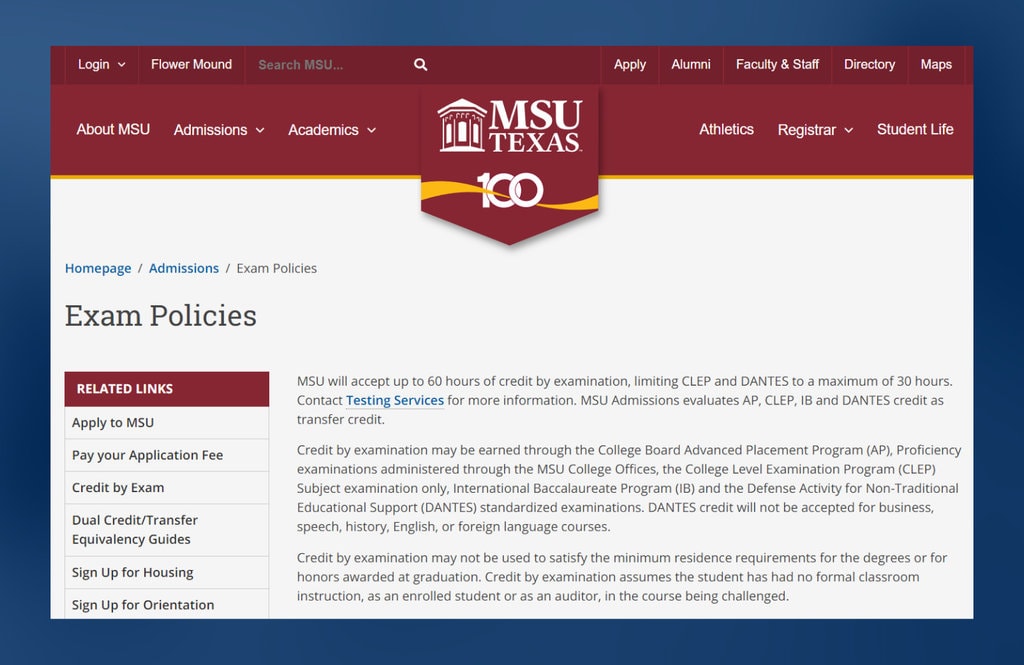
- Choose an exam that matches the knowledge and expertise you already have. These exams are administered through the:
- College Level Examination Program (CLEP)
- Dantes Subject Standardized Tests (DSST)
- Thomas Edison State Credit (TECEP)
- New York University Language Exams
- Excelsior College Exams (ECE)
There are a lot of choices for exams, so you’re sure to find a few that will match your knowledge.
- Register for the exam online and pay your fee. Each exam will give you from 3-16 credits.
| Exam | Fee |
| CLEP | $80 |
| DSST | $80 |
| TECEP | $75 |
| ECE | $110 |
| NYU | $450 |
- Choose a study guide. These will usually be recommended by the site administering the exam. Always go with the official study guide from the site, not some knockoff version on eBay. Not worth it.
- Schedule a time to take the exam at either a test center, college, or online (TECEP offers the option of writing online).
- Study your butt off! This is not the easy part. You will have to put the work in for this.
- Write your exam.
- Take the night off and binge-watch all the Netflix shows you had to put on hold while you studied.
- But no, you’re not done. Take as many credit by exams as your university will allow.
When it comes to quick degrees, credit by exam is the fastest way to shave time off your degree. You can get credit for a class, but not spend 4 months listening to lectures and completing assignments. You simply take the exam, and you’re done.

Turn your life experience into college credits with a Credit for Prior Learning portfolio
You know how people joke that they went to the “School of Hardknocks”? Credit for Prior Learning (CPL) is what gives you actual college credits for your life experiences. Most universities and colleges will have policies in place to help you earn credit for your past work or life experiences, saving you a LOT of time in classes.
Some names used for getting credit for life experience are:
- Prior Learning Assessment (PLA)
- Credit for Prior Learning (CPL)
- Portfolio Assessment
- Recognition of Prior Learning (RPL)
- Prior Learning Assessment and Recognition (PLAR)
- Experiential Learning
- Alternative Credit
We’re going to use Ivy Tech Community College as an example to show this is a real thing. At Ivy Tech, they call it a Prior Learning Assessment (PLA) Portfolio. Here’s how you would go about getting credit for the School of Hardknocks at Ivy Tech.
- Most schools will require that you are enrolled in a degree program to qualify for PLA credit, and this is also true of Ivy Tech.
- At Ivy Tech, your first step is to meet with your faculty advisor.
- The two of you will determine what courses are the best fit for your pre-existing skills.
- Then, you put together your portfolio exactly the way your school wants it done. Attention to detail is key.

Include any of these accomplishments:
- Life experiences
- Clubs
- Volunteering
- Hobbies
- Training
- Recreational pursuits
- Travel
- Describe what competencies you have mastered, your goals for the future, and demonstrate how you have already covered the material from the course descriptions.
- Include any documents, awards or letters of recommendation you have received.
At Ivy Tech, there is a $50 fee for each PLA portfolio that you submit. If you have the right mix of experience, credentials, and knowledge, you can apply for multiple class credits through PLA. Utilize this! Rack your brain for how you can get credit for everything you’ve already done.

Get college credit for your certifications and licenses
If you have been working as a professional already, your certificate or license may qualify you for college credit without having to submit a portfolio. That means less work. That is a good thing.
You could get credit for:
- A pilot’s license
- Being a Certified Public Accountant
- Military Service
- Being a Project Management Professional (PMP)
- Being a Real Estate Agent
- Working with Ameritech
- Working as an Early Childhood Professional
- Working at IBM
- Being a Manager at Chili’s
- Even working at McDonald’s!

Here’s the full list of organizations that could earn you college credit. Take a look! You could be sitting on a wealth of experience!
The American Council for Education will even give you a list of which institutes accept ACE credit.
Bismarck State College (BSC), for example, provides Credit for prior Industry Training.
Here’s how to get your credit at BSC:
- Search through the list of ACE credit recommendations.
- Match your workplace training with a BSC course.
- Register for the ACE Transcript and have your transcript sent to BSC.

Take the maximum credits allowed each semester
This option translates to “put your nose to the grindstone and do nothing but school.” We call it the “get ‘er done!” approach. Quick degrees require some effort, just like any other degree program.

A typical college or university on-campus program will allow you to take 18 credit hours in the fall term, 18 credit hours in the spring, and 6 hours in the summer. This would add up to 42 credit hours per year at a traditional campus program.
If you add in taking two online classes at a time, you can add an extra 6 credit hours every 8 weeks. Sometimes, if you are really smart, have a good GPA, and have your school’s permission, you can take up to 9 credit hours online every 8 weeks. We know someone who used this approach at Columbia College and managed to earn 54 credit hours in a year.

Get college credit for your military experience
Serving in the military requires hardwork and dedication. That can also translate into college credits for your service. The ACE will work together with the Department of Defense to review your military training and experience. Together, they can recommend the right college credits for a member of the Armed Forces.
The military offers a document called the Joint Services Transcript (JST), which provides proof of a service member’s experience and training. Your JST will also recommend which ACE college credits you qualify for. Of course, each institution, program, and degree will vary on what credits they accept. Check it out first. You don’t want to make a plan and then have it fall to pieces. Not fun.
Most schools will provide credit for at least some of your military experience. Independence University, for instance, states that military experience and previous college credits could meet up to 75% of your credit requirement.

Your JST can be as simple to get as:
- Logging into the JST website
- Clicking on “Official Transcript Request”
- Selecting your school
- Choosing to have the transcript delivered electronically or via U.S. Postal Service
Quick degrees are just like any other bachelor’s degree; you still earn all of your college credits but in alternative ways. Military experience is credit earned. And over 2,300 U.S. universities and colleges will give you the credit you deserve for what you learned in the service.

Participate in an internship
The thought of an internship often makes us shudder as we think of long, grueling hours doing grunt work and getting little to no pay.
But on occasion, an internship can be more than that. You just have to know how to play it.
Some colleges will award you credit for an internship. You work AND you get credits. That’s a good combo. Like ham and pineapple pizza.
One example is Loyola University Chicago. LUC offers credit for an internship that builds on the knowledge in the classroom, teaches you transferable skills, has defined goals, and is supervised by a professional.

Here are the steps to working and getting credit from LUC at the same time:
- Find a job that is related to your field and matches your school’s criteria for an internship.
- Submit a position description to the Internship Director requesting approval to count the job as an internship.
- Enroll in the coordinating course offered by your school, usually a 1-3-credit-hour class.
- Complete your internship with flair and style!
- Turn in any course assignments.
- Receive 1 credit for 56 work hours, 2 credits for 85 work hours, and 3 credits for 120 work hours.
- Revel in your genius skills of gaining work experience and credits simultaneously.
Just a word of caution: Check everything out before you agree to an internship. Everything.
Make sure that:
- Your company will participate in an internship credit program.
- Your college will accept the internship for credit.
- You cover all the details of how many hours you can and have to work, what paperwork is required, and whether you need to pay for the credits.
You’ll also want to speak to the hiring manager at the company you’ll be working for to determine your job duties and learning opportunities.

Participate in an Alternative Break program for college credit
Spring Break is usually associated with trips to Florida and wild, crazy parties. But if you are serious about getting your degree quickly, you can use your Spring Break to get… more credits!
But this isn’t a boring stuck-in-class-while-everybody-else-has-fun option. You will most likely have an awesome experience as you learn valuable life skills, immerse yourself in another culture, make memories for a lifetime, AND get college credit.
Ivy Tech Community College (making a second appearance as our example school) offers a 1-week trip to London, England. Um, hello? That sounds super amazing.

You pay $1,998 and get:
- 3 credits
- A trip to the heart of London where you explore the history, art, architecture, and development of one of the world’s most fascinating cities
- Transportation to the airport, round trip flights, and your hotel room.
Seriously, what a fantastic life experience. AND you earn credits.

Enroll in an Intersession Abroad session
Let’s say you tried a “little” trip abroad on your Spring Break. Now you’re bitten by the travel bug. The good news is there are even bigger opportunities for earning credits by traveling abroad.
By the way, being able to say “I spent some time abroad” makes you sound like you belong on the set of Downtown Abbey.
Merrimack College has an opportunity to spend 3 weeks over Summer Break in San Gimignano, Italy. You get to study Michelangelo, his world-famous sculptures, paintings, and architecture. See it all for yourself!

Total cost is $6,200 and gives you:
- 8 credits
- Round-trip airfare
- Hotel accommodations, meals, transportation, and tickets
- Travel insurance
AND
- An amazing unforgettable life experience
There is no way to put a price tag on experiences. Earning credits seems more like a bonus to what you’ll see and do.
Opportunities for High School Students to Earn College Credit

You can get a head start on your degree while you are still in high school. You are going to school anyway, so why not get ahead?
While your peers are playing video games and spending time on Snapchat, you could be earning college credits. In a couple years, those friends will be stuck in college classes and crying about exams while they’re up to their necks in student loans.
In the meantime, you could be done with your degree, working making money or going on to a postgrad program and already adulting successfully.
Take a look at the next 4 opportunities specifically for high school students to get a jump start on earning a college degree quickly. We’ll take examples from the Minnesota Office of Higher Education, but most states will have similar programs in place. Just Google “College credit in high school” and your state name.

Take dual credit classes
Dual credit classes = taking one class and getting high school AND college credit. Double the credits but the same amount of work. Like dating somebody who is hot and has a great personality!
Common names for this program are Concurrent Enrollment, Dual Credit, Dual Enrollment, College in the Schools, CEP, College Now, and College in High School.

How it works in Minnesota:
- Juniors and Seniors with adequate school grades can take FREE college-level courses at their high school.
- You work hard, you learn lots, and you pass the class. Just like you’re doing for all your other high school classes.
- Your high school’s partnering college will award you with 3 college credits.
- You can put that college credit toward your future degree. Check to make sure you are taking courses that will count for your degree to save you time and money in the end.
Just like that. You are a high school student, and you have college credit. You’re ahead of the game.

Take Advanced Placement classes
Advanced Placement (AP) classes are like dual credit courses. The major difference is that to earn the college credit, you must take an AP exam. You also must pay for the exam. In Minnesota, it is $44-53 per exam.
The steps:
- Be a high school student with an acceptable GPA.
- Complete the classwork and learn as much as you can.
- Check with the college you want to attend regarding what score you need to be awarded credit. It’s usually 3 or higher.
- Study hard!
- Take the AP exam, which is a college-level exam.
- Get excited (if you have a happy dance, now would be a good time to use it) when your fantastic exam score is submitted to the college of your choice and you earn 3 college credits.

Participating in AP classes while still in high school prepares you for college classes. Not only will you have the credit, but you will also have the confidence you need to conquer college.

Participate in an International Baccalaureate Diploma program
Do you dream of attending college internationally? The International Baccalaureate (IB) program is ideal because the credits you earn are often recognized internationally.
The IB is a 2-year pre-college program geared toward high school students ages 16-19 years. Courses are offered in 6 subject groups: primary language, second language, mathematics, experimental sciences, arts, and humanities.

The steps are similar to an AP class but more intensive:
- Be a high school student with an acceptable GPA.
- Complete the class work in all 6 subjects, learning as much as you can.
- Nose to the books! You are going to have to take all 6 subject exams and earn at least 24 points to get your pre-college diploma.
- Take the IB exams. In Minnesota, each exam costs $20-80.
- Participate in a community service program.
- Write an essay of 4,000 words.
- Complete the Theory of Knowledge course.
- Start looking at international colleges and dream of sipping coffee in Venice while attending “university.”
An IB pre-college diploma gives you an advanced start to attending college. Your credits will often be recognized internationally, and your academic performance will be enhanced. Definitely a strong start to college! Like the superhero of college prep courses.

Take part in a pre-college summer program
You can even take summer college courses in your sophomore, junior, or senior years. Cornell University offers high school students the opportunity to take some really interesting classes (veterinary medicine, art, design, fashion, robotics, etc.) over the summer on the Cornell University campus taught by University professors.
The courses vary from 3-6 weeks, and you can walk away with 3-8 credits, plus the experience of ACTUALLY attending University classes. Pre-college summer courses are also offered online. That’s right, earn credit from home in your comfy clothes while sipping on your morning java.

You’ll need to:
- Be a sophomore, junior, or senior younger than 18 when you graduate high school.
- Be awesome. You’ll need high academic ability, maturity, and intellectual curiosity. Of course, the fact that you are looking at this site means you probably have those skills. Don’t underestimate yourself.
- Submit an application and a letter of recommendation. Admission is not based on GPA, which is something that can help you if your high school grades aren’t very good.
By taking advantage of a few of these fast-track methods to earning your degree, you can graduate with a bachelor’s early and get ahead of the curve in the working world.
Learn More About Earning Your Degree Online
Prepare yourself for starting that new degree by reading about the following:
- How Quickly Can You Finish an Associate’s Degree?
- How Quickly Can You Finish a Bachelor’s Degree?
- Is It Possible to Earn a 6-Month Bachelor Degree?
- Quick Online Degrees: How and Where to Start
- Are Quick Degrees Easy?
- Undergraduate and Graduate School Admissions Tests
- Undergraduate General Education Requirements
- The Value of Quick Degrees Online
- Quick College Degree Programs Offer So Many Possibilities
- Accredited Quick Degrees Online – Reputable?
- Regional Accreditation vs. National Accreditation
- Paying for an Accelerated Online Degree
- The Future of Degrees
- On Your Mark…
How Quickly Can You Finish an Associate’s Degree?

We’ve covered many different options and opportunities to help you earn your degree quickly. But how fast do you think you could earn an Associate’s degree?
Check out this example and be amazed.
An Associate’s degree is basically just completing the general education requirements of a four-year college. Most colleges will state that you need at least 60 credit hours, which typically equals 5 courses per semester, 2 semesters per year, meaning you could finish in 2 years.
Or…
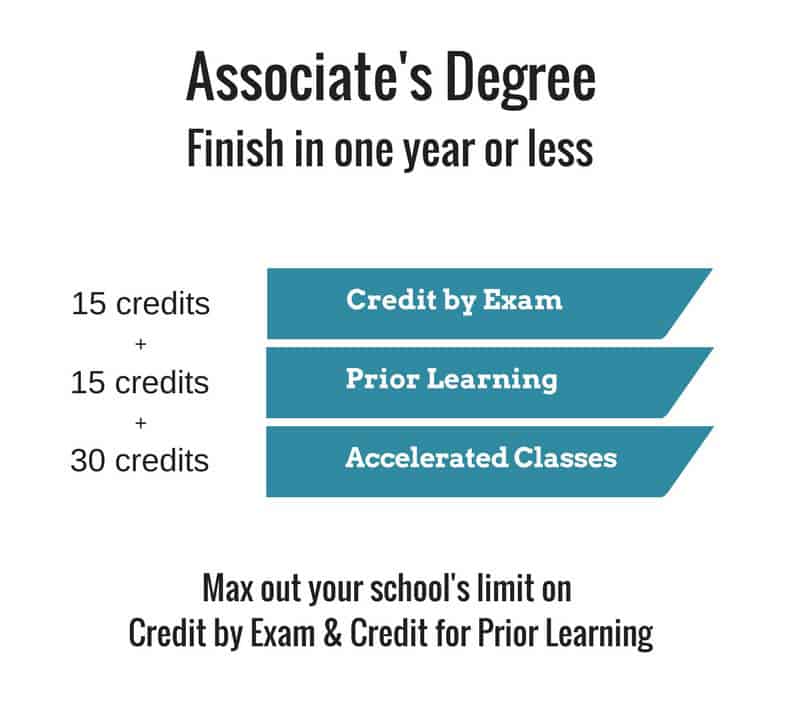
- Enroll at a university that allows you to earn 15 credits (or more) via credit by exam. Most online universities will allow up to 15 credit by exam hours. Take full advantage of this!
- Submit a Credit for Prior Learning (CPL) portfolio. Many universities will set a limit on how many credits you can get from your CPL portfolios. The goal would be to get at least 15 credits for all the work you have already done.
At this point, you have already gathered half the credit hours (30 credit hours) you need for your Associate’s degree without taking a class. The last part will involve some dedicated hard work, but it will be fast.
- Register for accelerated online classes. Accelerated online classes typically last 8 weeks. The majority of schools will have 5 or 6 semesters per year for online classes. If you take 2 classes worth 3 credit hours every 8 weeks, you will earn 30+ credit hours in a year.
Using this approach, you can go from having absolutely zero credits to being finished with an Associate’s degree in less than 1 year.
How Quickly Can Finish a Bachelor’s Degree?

Staring down the timeline of a Bachelor’s degree can be daunting. Earning your degree typically involves 4 years of your life dedicated to classes, group assignments, textbooks, writing papers, and not being able to make a full-time income. That’s a huge chunk of your life to put into a Bachelor’s degree!
But it doesn’t have to be that bad. Promise. We’ve been there, remember? One of our staff member’s spouse desperately needed to be done with their degree in the quickest time frame possible. They didn’t have the time or money to slog away at 4 years of college. So, here’s what worked for them:
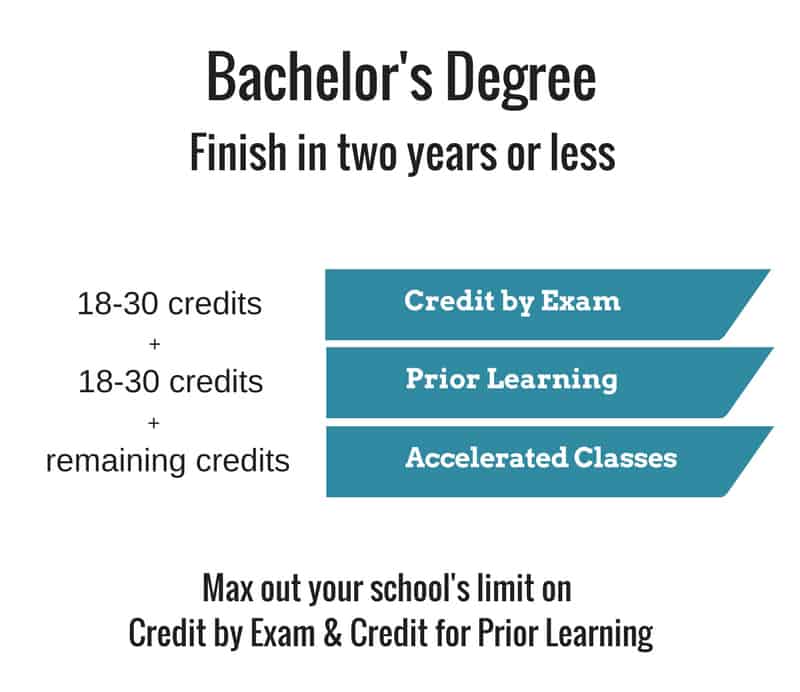
- Enroll in a university that will grant you at least 18-30 credits via credit by exam. Maybe even more.
- Complete and submit a Credit for Prior Learning (CPL) portfolio. Some universities will place a cap on how many CPL credits you can have toward your degree. A good option is a college like Charter Oak State College, which has no limit on how many CPL credits you can have. Aim for at least 30 credits.
At this point, you will have 60 credit hours completed. That’s halfway there! Time for the mad dash to the finish line.
- Register for accelerated online classes. Accelerated online classes typically last 8 weeks. The majority of schools offer 5 or 6 semesters per year for online classes. If you take 2 classes worth 3 credit hours every 8 weeks (meaning 6 semesters in a year), you will earn 36 credit hours every year.
That’s 60 credit hours from your Credit by Exams and Credit for Prior Learning, 36 credits in your first year through online classes, and in the next 6 months, you continue with online classes and earn another 24 credit hours. You’re done! Bachelor’s degree in 18 months.
Add in other scenarios, such as when you already have a few college credits or you qualify for credits via your military experience, you could be done with your degree even faster.
The absolute quickest possibility would be to attend a college like Charter Oak State College. Charter Oak State has NO limits on credit by exam or CPL. You could work like crazy submitting portfolios and taking every exam you possible.
If you stay focused and ace those exams like the hardworking genius you are, you could get a Bachelor’s degree in less than 1 year.
1 year.
An elephant is pregnant for longer than that. You could have a Bachelor’s degree quicker than an elephant has a baby.

An accelerated online degree allows you to jump-start your earning power. Who says no to earning more money? The choices of potential careers offer something for everyone.
With the adoption of distance learning, online classes, and quick degrees by many traditional colleges and private institutions, there is a wealth of choices to make. You could end up with 4-5 different degrees in your career! If you wanted to go all crazy like that.
Planning your path to a degree will show you shortcuts, but there are no substitutes for studying and hard work. Being aware of all your options will help you to make the most informed decisions for your future career and financial stability.
Degrees do pay off over time, and earning a quick online degree puts you into the job market faster and with less debt than the traditional on-campus route.
Is It Possible to Earn a 6-Month Bachelor Degree?

Woah, slow down! You’ve heard of honorary degrees, right? That’s about the only way to earn a bachelor’s degree from a reputable college in less than a year. And if you’re in a position that universities are handing you degrees, you don’t need them.
Now, it is possible to earn other types of degrees in less than a year, and some of them may help you build toward a bachelor’s, so let’s take a look at your options.
Quick Online Degrees: How and Where to Start

It can be a little confusing trying to figure out the differences between a certification, a technical diploma, and the degrees classified as an associate, baccalaureate, and master. Very often, community colleges (also called junior or two-year colleges) and proprietary educational institutions will offer the first three, and colleges and universities the latter two.
- Certificate: Generally issued for a specific technical or vocational course of study without the educational breadth requirement.
- Technical diploma: More advanced than a certificate and with hands-on practical instruction. An example would be a nursing diploma issued by a hospital-based nursing school.
- Associate degree: Essentially the lower division courses that could comprise the first two years of a baccalaureate degree, with a focus on technical skills as well as general education requirements. For example, an Associates of Applied Science in Accounting features gen ed courses with accounting classes but not much in other areas of business.
- Bachelor degree: Sometimes called a four-year degree, this is composed of broad general education requirements followed by upper-division courses related to the student’s major area of study.
- Master degree: Postgraduate degree indicating a specialized area of study and depth of knowledge.
The decision to further your education with one of the many quick online degrees can take you into an in-demand career with good pay, job security, and financial stability. But it is not all easy-peasy. Don’t just jump in.
You will want to consider that while associate degree credits can usually be transferred to a four-year institution, a certificate or technical diploma cannot – unless in very specific circumstances such as a nursing diploma RN entering a BSN program later in his or her career.
A student in a degree program could choose to pursue a certification in various skills related to their chosen field as a way to enhance their skills and make themselves a more valuable hire. Meaning: Make more money and get more promotions.

Other cases, such as professional certifications, may also intersect with your chosen course of study. For example, a Computer Science major might seek Cisco certifications related to a specific field, such as network architecture.
Likewise, credits from undergraduate studies resulting in a bachelor’s degree may be considered during the admissions process to graduate school programs.
There are even accelerated programs for a master’s degree, where the student starts to take upper-division courses that may also be applied toward the core curriculum requirements of the master’s program.
Such a program is called the 4+1 , or blended master’s degree, as the four years of undergraduate work are followed by only one year of graduate school instead of following the traditional two-year timeframe.
Are Quick Degrees Easy?

This is a pretty common question. Online degrees earned at an accelerated pace are just as rigorous as the traditional, on-campus classes. Yes, online degrees offer quick online classes at 5-week, 6-week, or 8-week intervals, but they aren’t any easier than any other college course.
For more info, check out these pages on our site:
You will still have to do your assigned readings, participate in class discussions, and submit assigned term papers. The primary difference between traditional college courses and online accelerated college courses is the lack of face-to-face interaction. The other aspects of the course are the same but in a condensed format. You have to do the work to pass the class.
Undergraduate and Graduate School Admissions Tests

Admission to a college program, even when entirely online, generally requires an application and academic records showing a certain grade-point average, and in many cases scores from the SAT (Scholastic Aptitude Test) or ACT (American College Testing). However, there are exceptions.
The National Center for Fair and Open Testing lists more than 1,000 schools that do not require the SAT or the ACT, and under what – if any – conditions. The list includes state universities, well-known private universities, proprietary schools, religious colleges, and even some of the “almost Ivy” colleges, such as Bates, Bowdoin, Colby, Swarthmore, Tufts, and Wesleyan.
If getting a high score on SATs wasn’t your goal in high school, you still have hope!
Purposes for which an SAT or ACT score may be required include:
- For accurate academic advising or class level placement.
- For out-of-state applicants only.
- When the minimum GPA has not been met.
- When applying for certain classes or programs.
In some cases, the SAT or ACT may be waived if your school submits other college-level exams as part of your academic records, such as those for Advanced Placement or International Baccalaureate curriculum or CLEP examinations.
Just because a school does not require an SAT or ACT score doesn’t mean it’s not an excellent school; it simply means that the school has other ways of looking at and assessing an applicant’s academic potential.
Graduate schools may require the GRE (Graduate Record Examination) or the GMAT (Graduate Management Admissions Test) for entry into an MBA program.
Undergraduate General Education Requirements

Unless you are applying to a strictly technical program at a proprietary school, as an undergraduate, you will be required to fulfill a certain number, of course, hours and pass the minimum requirement before the school will issue your undergraduate degree.
This means that you will have to finish your classes and jump through all the hoops: hand in papers, finish assignments, do a good job, and get passing grades.
These courses represent a higher level of learning than most high school courses and are considered the foundation of an undergraduate degree, even when you’re going for quick degrees. These courses are expected to dominate the freshman and sophomore years of a bachelor’s degree, and are as follows:
- Mathematics
- Composition
- History
- Natural Sciences
- Arts and Literature
- Social Sciences
- Languages
However, there are ways around the requirements that can save time as well as a large amount of money. It’s like a secret spy entrance. The password is CLEP.
The average tuition for a course is about $700 – significantly less in some schools or more in others – so why not take an $80 exam that delivers as many as 12 credits in 90 minutes?
The College Level Examination Program offers examinations to replace 33 lower-division courses and is accepted by thousands of institutions as creditable coursework for the above requirements.
| Choices, Choices… | The Smart Choice! |
| $700 for 3 credit hours | $80 for up to 12 credit hours |
| 4 months sitting in class | 90 minutes taking a test |
| Completing assignments with due dates | Studying on your own time |
Don’t forget that these are college-level exams. This isn’t your friendly fifth-grade homework assignment “write about your summer.” Testers are expected to show command of the course material equivalent to that of a student ending their sophomore year.
Beyond simply saving on tuition, by taking and passing the examinations for courses that require laboratory work, you eliminate the need to commute to those classes. More savings! More free time!
The Value of Quick Degrees Online

The value of quick degrees in a rough economy might not be obvious. But there’s the cost of classes, course materials, and the time and effort needed to study and pass.
If you look at the value of a degree – any degree – over time, you will see that it all adds up.
The National Labor Board’s Bureau of Labor Statistics recently conducted research into all full-time workers over the age of 25 across all levels of educational attainment and averaged their pay and unemployment percentages to $827 per week with 6.1% unemployment.
Here’s the breakdown of the different earnings between master’s degree and high school diploma levels:
| Education | Weekly Earnings | Annual Earnings Compared to Average | Unemployment Rate |
| High School Diploma | $651 | -$9,152 | 7.5% |
| Some College | $727 | -$5,200 | 7% |
| Associate’s | $777 | -$2,600 | 5.4% |
| Bachelor’s | $1,108 | +$14,612 | 4% |
| Master’s | $1,329 | +$26,104 | 3.4% |
Thinking about those earnings across only 10 years of a career can make the choice seem obvious:
- High School Diploma: Over 10 years, will see $91,520 less than average in earnings.
- Some college but no degree: Over 10 years will see $52,000 less than average in earnings.
- Associate’s degree: Over 10 years, will see $26,000 less than average in earnings.
- Bachelor’s degree: Over 10 years, will see $146,120 above average earnings.
- Master’s degree: Over 10 years, will see $261,040 above average earnings.
And these numbers are only average, not accounting for career advancement, raises, or periods of unemployment. Salaries also vary by specialty.
What would you choose? The possibility of making $146,120 moreover 10 years or earning $91,520 less in 10 years? I can think of a lot of good uses for $146,120. I bet you could too!
Quick College Degree Programs Offer So Many Possibilities

Unless a preferred course of study has significant laboratory requirements, it is possible to attain most degrees online, from wherever you have an internet connection.
Some of the many possibilities for quick online degrees include:
- Accounting: Finance Accounting, Forensic Accounting, and Accounting Information Systems
- Business: Business Administration, Business Finance, and Marketing
- Computer Science: Software Design, Network Management, and Web Development
- Criminal Justice
- Fashion and Fashion Management
- Healthcare Management
- Mathematics
- Public Administration
- Video Game Design and Development
These are only a few of the options available for you to complete online, and the only way to find the program you’re looking for is to shop around. Do some online window shopping.
Even if you can’t find everything you want at one school, or in one program, as long as you take courses from accredited institutions, those credits should be transferable to another school where you may choose to complete the requirements for your degree.
Accredited Quick Degrees Online – Reputable?

When you do a search for quick degrees on Google, you will see some sketchy results. Stay away from any school that says they will hand you a degree in exchange for cash. Run. Quickly!
Legitimate quick degrees are simply regular degrees offered by accredited colleges, with a couple of notable exceptions. When it comes to quick degrees, you sit in the driver’s seat and maximize every alternative college credit option available to you, whether it’s credit by exam, credit for life experience, time in the military, or fluency in a foreign language.
Rather than take the traditional path of ONLY sitting in class, quick degrees are reputable degrees offered by reputable universities. You just make the most of the school’s existing academic policies to get the credit you deserve for what you already know!
Regional Accreditation vs. National Accreditation

Checking your school’s accreditation and your program’s accrediting bodies is a vital step and should never, ever be skipped for any reason whatsoever. Never. Ever. Promise you won’t skip this.
Accreditation means the difference between a valuable degree and a meaningless entry on a resume, or possibly losing everything you’ve worked so hard for to an unscrupulous school.
Accreditation means a standard quality of instruction and course materials, accountability, and the transferability of credits earned from that coursework to another degree-granting institution as needed by the student.
If you earn an Associate of Science in Accounting from a community college, you want to be able to continue your education and earn a baccalaureate at a four-year state college. Or if you were at a four-year college, you want to be sure you can use that degree to apply to a master’s program.
You will need the prospective school to agree and verify that your coursework and degrees meet the standard of their own programs. If the school was not accredited or bought accreditation from an accreditation mill, you’ll see yourself having to start all over again.
This is where the CHEA (Council for Higher Education Accreditation) comes in. CHEA accredits schools and programs at 3,000 degree-granting schools and 60 institutional and program-related accrediting bodies. Among the accrediting organizations, CHEA recognizes several types:
- Regional Accrediting Organizations: Accrediting a group of schools within a given group of states
- Faith-Related Accrediting Organizations: Accrediting religious education and theological schools
- Career-Related Accrediting Organizations: Accrediting distance study programs and proprietary schools
- Programmatic Accrediting Organizations: Accreditation pertaining to particular majors and career paths
Checking with CHEA and the Department of Education for accreditation protects you, your investment, and your future potential earnings from fraudulent schools with fraudulent accreditation that will give you a worthless degree.
Paying for an Accelerated Online Degree

Even though you’re taking classes online versus on campus, you still might qualify for significant financial aid. Start by filling out the Free Application for Federal Student Aid (FAFSA) to see what government help you may be able to take advantage of.
Also, check your state’s website for possible education incentives as well as the school you’re applying to for scholarships. Besides the government and school, there are also many philanthropic or corporate organizations that offer scholarships and grants to certain students.
And don’t forget to ask your employer about tuition reimbursement. If you agree to continue working for them for a set period after you earn your degree, many employers will pay all or part of your education expenses.
The Future of Degrees

The need of the workforce for highly educated, specialized workers is not going away anytime soon. From nursing to high finance and education to computer science, degrees are becoming as much a qualification for entry-level jobs in growth professions as a high school diploma was in our grandparents’ day.
Programs for quick online degrees can put you into a highly competitive workforce faster. You could be starting with potentially less debt to repay than a more traditional format.
At the same time, people with hectic schedules, home life demands, or even those already in the workforce can benefit by choosing classes that fit their schedules instead of shoehorning classes into an already jam-packed life. Make the most of your time, take steps toward financial and job security, and maximize your potential earning power by starting your search today.
On Your Mark…

Getting the fastest bachelor degree may be a necessary step for getting a job. But if you lack the time and money that is needed to invest so much of your life into earning a degree the traditional way, don’t feel stuck. Get creative!
There ARE quick degrees available to get a Bachelor’s degree without sacrificing 4 years of your life.
Using the tips above, look for how you can earn credits faster and apply them to your online degree.

